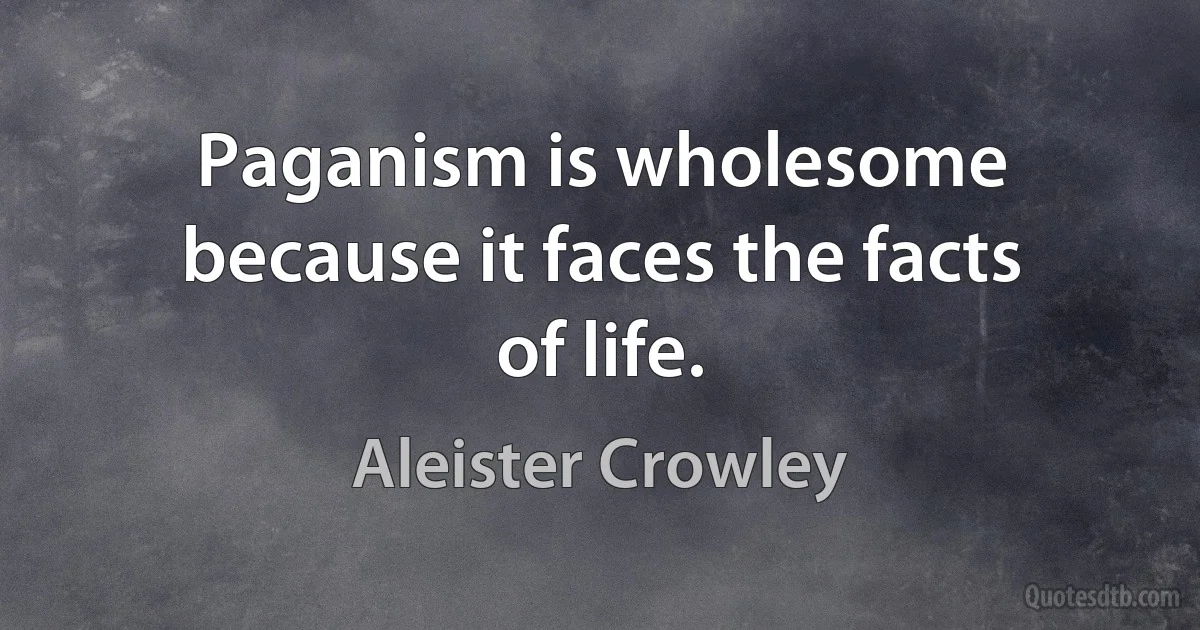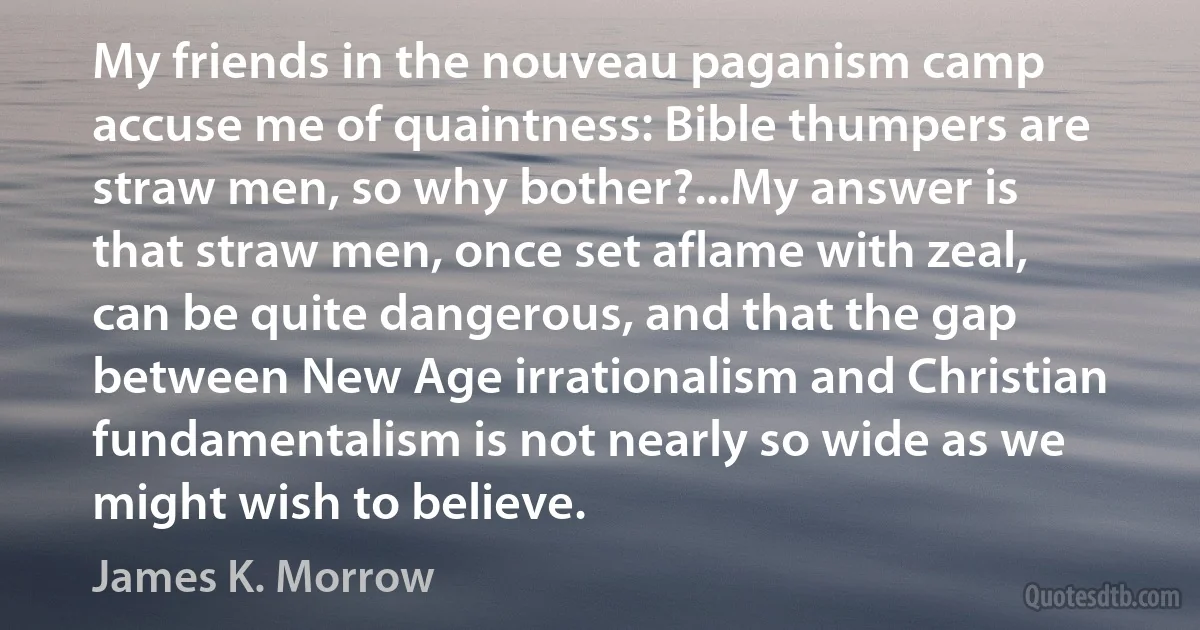Paganism Quotes
I studied the Quran a great deal. I came away from that study with the conviction that by and large there have been few religions in the world as deadly to men as that of Muhammad. As far as I can see, it is the principal cause of the decadence so visible today in the Muslim world and, though less absurd than the polytheism of old, its social and political tendencies are in my opinion more to be feared, and I therefore regard it as a form of decadence rather than a form of progress in relation to paganism itself.

Alexis de Tocqueville
The heroes in paganism correspond exactly to the saints in popery, and holy dervises in MAHOMETANISM. The place of, HERCULES, THESEUS, HECTOR, ROMULUS, is now supplied by DOMINIC, FRANCIS, ANTHONY, and BENEDICT. Instead of the destruction of monsters, the subduing of tyrants, the defence of our native country; whippings and fastings, cowardice and humility, abject submission and slavish obedience, are become the means of obtaining celestial honours among mankind.

David Hume
I here, on the very threshold, protest against it in reference to Paganism, and to all other isms by which man has ever for a length of time striven to walk in this world. They have all had a truth in them, or men would not have taken them up. Quackery and dupery do abound; in religions, above all in the more advanced decaying stages of religions, they have fearfully abounded: but quackery was never the originating influence in such things; it was not the health and life of such things, but their disease, the sure precursor of their being about to die! Let us never forget this.

Thomas Carlyle
Mark at present so much; what the essence of Scandinavian and indeed of all Paganism is: a recognition of the forces of Nature as godlike, stupendous, personal Agencies,-as Gods and Demons. Not inconceivable to us. It is the infant Thought of man opening itself, with awe and wonder, on this ever-stupendous Universe. To me there is in the Norse system something very genuine, very great and manlike. A broad simplicity, rusticity, so very different from the light gracefulness of the old Greek Paganism, distinguishes this Scandinavian System. It is Thought; the genuine Thought of deep, rude, earnest minds, fairly opened to the things about them; a face-to-face and heart-to-heart inspection of the things,-the first characteristic of all good Thought in all times. Not graceful lightness, half-sport, as in the Greek Paganism; a certain homely truthfulness and rustic strength, a great rude sincerity, discloses itself here.

Thomas Carlyle
What I called the perplexed jungle of Paganism sprang, we may say, out of many roots: every admiration, adoration of a star or natural object, was a root or fibre of a root; but Hero-worship is the deepest root of all; the tap-root, from which in a great degree all the rest were nourished and grown.

Thomas Carlyle
Hinduism is the name for the Indian territorial form of worldwide Sanatanism (call it Paganism in English). The ideology of Hindutva should therefore be a Universal ideology: On the international level, the Sangh, as the apex organisational body of Hindutva ideology, should spearhead a worldwide revival, rejuvenation and resurgence of spiritualism, and of all the religions and cultures which existed all over the world before the advent of imperialist ideologies like Christianity, Islam, Fascism, Marxism, etc.

Shrikant Talageri
Pornography's male-born explicitness renders visible what is invisible, woman's chthonic internality. It tries to shed Apollonian light on woman's anxiety-provoking darkness. The vulgar contortionism of pornography is the serpentine tangle of Medusan nature. Pornography is human imagination in tense theatrical action; its violations are a protest against the violations of our freedom by nature. The banning of pornography, rightly sought by Judeo-Christianity, would be a victory over the west's stubborn paganism. But pornography cannot be banned, only driven underground, where its illicit charge will be enhanced.

Camille Paglia
"For many, abstract thinking is toil; for me, on good days, it is feast and frenzy.” (XIV, 24) Abstract thinking a feast? The highest form of human existence? ... "The feast implies: pride, exuberance, frivolity; mockery of all earnestness and respectability; a divine affirmation of oneself, out of animal plenitude and perfection-all obviously states to which the Christian may not honestly say Yes. The feast is paganism par excellence.” (WM, 916). For that reason, we might add that thinking never takes place in Christianity. That is to say, there is no Christian philosophy. There is no true philosophy that could be determined anywhere else than from within itself.

Martin Heidegger
Even Plato assumes that the genuinely perfect condition of man means no sex distinction (and how strange this is for people like Feuerbach who are so occupied with affirming sex-differentiation, regarding which they would do best to appeal to paganism). He assumes that originally there was only the masculine (and when there is no thought of femininity, sex-distinction is undifferentiated), but through degeneration and corruption the feminine appeared. He assumes that base and cowardly men became women in death, but he still gives them hope of being elevated again to masculinity. He thinks that in the perfect life the masculine, as originally, will be the only sex, that is, that sex-distinction is a matter of indifference. So it is in Plato, and this, the idea of the state notwithstanding, was the culmination of his philosophy. How much more so, then, the Christian view.

Søren Kierkegaard
The immediacy of falling in love recognizes but one immediacy that is ebenburtig (of equal standing), and this is a religious immediacy; falling in love is too virginal to recognize any confidant other than God. But the religious is a new immediacy, has reflection in between-otherwise, paganism would actually be religious and Christianity not. That the religious is a new immediacy every person easily understands who is satisfied with following the honest path of ordinary common sense. And although I imagine I have but few readers, I confess nevertheless that I do imagine my readers to be among these, since I am far from wanting to instruct the admired ones, who make systematic discoveries a la Niels Klim, who have left their good skin in order to put on the "real appearance.”.

Søren Kierkegaard
Notwithstanding, the disciples of Jesus, excepting John the Revelator, suffered ignominious deaths, they sowed the seed of the Gospel among, and conferred the Priesthood upon men, which remained for several generations upon the earth, but the time came when Paganism was engrafted into Christianity, and at last Christianity was converted into Paganism rather than converting the Pagans. And subsequently the Priesthood was taken from among men, this authority was re-called into the heavens, and the world was left without the Priesthood-without the power of God-without the Church and Kingdom of God.

Joseph F. Smith
For those who struggle with anti-pagan prejudices and stereotypes, Humanist Paganism might be a powerful educational tool. It can show that a pagan can be a sophisticated, cosmopolitan, and enlightened person, and that a pagan culture can be artistically vibrant, environmentally conscious, intellectually stimulating, and socially just.

Brendan Myers
Paganism emblemed chiefly the Operations of Nature; the destinies, efforts, combinations, vicissitudes of things and men in this world; Christianism emblemed the Law of Human Duty, the Moral Law of Man. One was for the sensuous nature: a rude helpless utterance of the first Thought of men,-the chief recognized virtue, Courage, Superiority to Fear. The other was not for the sensuous nature, but for the moral.

Thomas Carlyle



